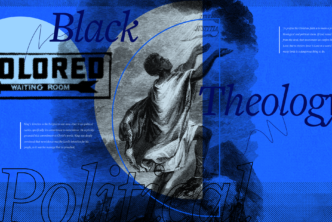End times discussions shouldn’t be fraught with wild speculation and discord.
In Jesus Wins, releasing this month, Dayton Hartman argues that a biblical view of eschatology produces a different response. It places Jesus’ return and victory at the center and inspires hope and greater faithfulness in the present age.
This excerpt reminds readers that the entire story of redemption is about getting us back to paradise and the intended relationship with our Creator that began in the garden of Eden.
***
Awaiting the End Times
For too many Christians, the purpose of our eschatological belief is largely relegated to the realm of conspiracy theories, discussion of scorched-earth fantasies, and fear of a coming world dictator. Those are all the trappings of a Nic Cage summer flopbuster..Yet, more than providing fodder for Hollywood, Christian eschatology serves a specific purpose that ought to consume every inch of our souls. The purpose of our eschatology shouldn’t be voyeuristic fascination with destruction, but rather hopeful anticipation of restoration. Russell Moore says that our hope for restoration and redemption includes “table fellowship, community, culture, economics, agriculture and animal husbandry, art, architecture, worship—in short, life and that abundantly.” Christian eschatology ought to cause us to think about the future. But it has more to teach us about our lives here and now than whether Blackhawk helicopters are in Revelation.
Shocking News
If you are asking “Are we living in the last days?” allow me to answer it for you: Yes! We are!
The author of Hebrews makes this clear:
Long ago, at many times and in many ways, God spoke to our fathers by the prophets, but in these last days he has spoken to us by his Son, whom he appointed the heir of all things, through whom also he created the world. (Heb 1:1–2)
The incarnation marked the beginning of the end. The final age has begun. The last days are here and have been here for two thousand years!
Anglican theologian Gerald Bray has observed that this theme is central to the New Testament: “One of the most pervasive themes of the New Testament is that we are living in the last days and that will come to an end suddenly and without warning.” Dear Christian, you are living in the final days of history as we know it—just like Peter, Paul, and John.
Changing Expectations
If we have been living in the last days for two thousand years, what is the purpose of Christian eschatological doctrine or belief? Simply put: Because Christ is present among his people—in an already-not-yet kind of way—we must live like it.
The story of humanity and its relationship to God began in the garden of Eden, and it ends with a return to Eden. The entire story of redemption is about getting us back to paradise. Our hope is not based on decoding the current news cycle; it’s about living now as we once did and as we one day will live again. All of Christian eschatology is building toward a resolution inaugurated by Christ’s life, death, resurrection, and ascension. . . .
Living Christ’s Triumph
We live knowing that we will one day get back to the garden when heaven comes to earth. Not only will death, sin, and Satan be defeated once and for all time, but we will again find our place and God’s place overlapping. We will one day know what it is like to experience humanness to its fullest form when we do so in the presence of the Creator. Christian eschatology should be marked by awe-inducing adoration. Jesus is coming back, and he wins. So live like it.1




